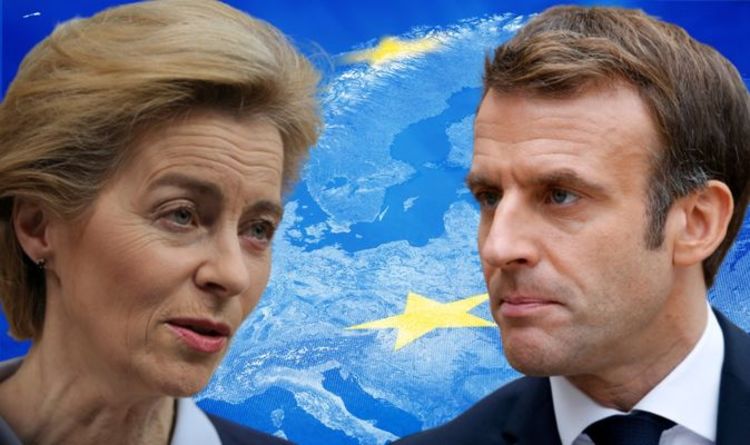Fishing: French fishermen discuss protests in Calais
We use your sign-up to provide content in ways you’ve consented to and to improve our understanding of you. This may include adverts from us and 3rd parties based on our understanding. You can unsubscribe at any time. More info
Following a meeting with EU Commission President Ursula von der Leyen, French Senate President Gerard Larcher said in a Tweet: “On fishing, I recalled our solidarity with fishermen. Our country also needs the support of the European Commission to obtain the licences requested from the British.” He also spoke of the need for more cooperation in dealing with the ongoing migrant crisis, saying: “In the face of the migratory crises, I stressed the urgent need to strengthen our external borders and to reach an ambitious Asylum and Migration Pact, to make returns to the countries of origin effective.”
The Senate leader also praised the EU’s joint effort in tackling the ongoing COVID-19 pandemic, in particular as the new Omicron variant begins to emerge across the continent, and wider arena.
Yet the core mandate of the meeting was for the French to reach out to the EU, and rally support against the British.
Mr Larcher said in a Tweet: “As the #EU2022 approaches, I was pleased, along with @sophieprimas and @RAPINJF to meet in Brussels with @vonderleyen. This meeting allowed us to address several crucial issues for France and Europe.”
For her part, Ms Von der Leyen said: “Glad to meet the President of the Senate Gerard Larcher in the run-up to the French Presidency of the EU.”
She added: “We had a look at the current issues.”


Expressing her support for the upcoming French Presidency of the bloc, she added: “The French Parliament will contribute to making this Presidency a success.”
France has been desperate to punish Britain for its perceived anger at not being issued fishing licences for French trawlers.
Following Brexit, London has claimed that any foreign vessel wishing to fish in British waters must be able to prove it had done so prior to the Withdrawal Agreement.
France claims London has not issued the correct amount of permits.
President Emmanuel Macron and his Ministers have vowed to punish Britain over the issue.


Measures have included the blocking of French ports to British vessels, adding extra tariffs on UK products, performing further customs checks at French ports of entry, and threatening to cut off electricity supplies to Jersey and the rest of the UK.
However, France has so far demonstrated and vented its frustration as a lone actor against the UK.
Attempts by Mr Macron to block an EU-Australia trade deal following the so-called AUKUS deal was met with a sour response by the Dutch.
Reports suggested the EU would have lost out on around £35bn should it have done so.
The EU has also failed to openly back the French when it comes to the fishing wars.
DON’T MISS:
MI6 boss in chilling China warning during first interview [REPORT]
Detroit school shooting: Three students dead, six injured [REVEAL]
Ireland doubles exports to EU to dodge bloc’s Brexit red tape [INSIGHT]

However, certain elements of European-wide cooperation have emerged in more recent times.
The Foreign Minister of Luxembourg slammed the British over the ongoing migrant’s crisis, stating that allowing migrants to work illegally in the country pulled them towards Britain.
Germany has also awoken from its post-election slumber by warning the EU and the UK to come to a swift and timely conclusion over the ongoing Northern Ireland Protocol.

With the French about to take the helm at the head of the EU in the rotating presidency, as well as Mr Macron about to face an upcoming election, it seems that French cries for help from its European partners is timed to perfection.
Pressure now lies on Mr Macron to deliver the goods in a final push towards his second term in the Elysee Palace.
With Eric Zemmour and Marine Le Pen hot on the heels of Mr Macron, securing a European wide slap against the British may just be the sucker-punch Mr Macron needs to defeat internal division in France, and cement together the EU as the lead bonding agent in a post-Merkel era.
Additional reporting by Maria Ortega
Source: Read Full Article
